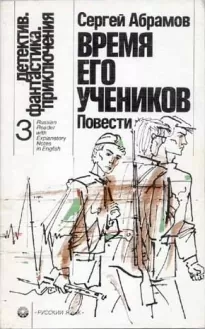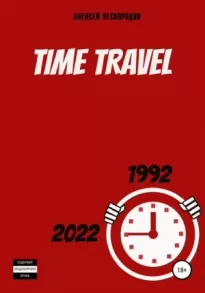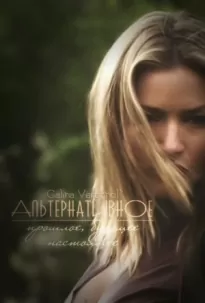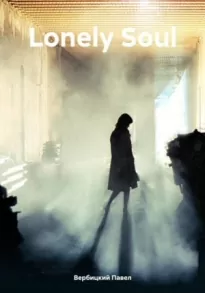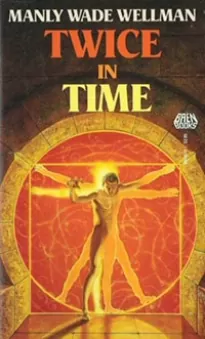Разговорный английский
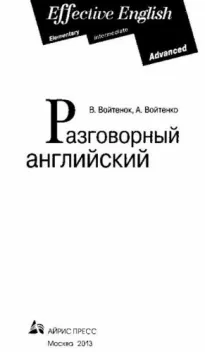
- Автор: Владимир Войтенок
- Жанр: Самиздат, сетевая литература
Читать книгу "Разговорный английский"
EDWARD: Good Lord! If it isn’t George!
G. No other.
E. Let me shake your crab.
G. Yes, and let me do the same.
E. What good wind brings you here?
G. I’m here on business.
E. What a small place the world is, after all!
G. Indeed it is.
E. I could have never thought of meeting you here in this out of the way place.
G. Same me. How are you, anyway?
E. Middling, and you?
G. Pretty well, thank you.
E. Well, well, George! It’s good to see you again after all these years.
G. Yes, and I am glad to meet you too.
E. You have changed a great deal.
G. In what respect?
E. You are thinner.
G. Yes?
E. Older, too.
G. I wouldn’t say that you look younger, eh?
E. Well, where have you put up?
G. I haven’t got fixed up yet. I’m right from the station.
E. How long do you intend to stay here?
G. For a day or two, I suppose.
E. Well, that’s fine. What about staying at my house? We could talk to our heart’s content then.
G. I’d be only too glad if —.
E. If what?
G. I wouldn’t be in your way. You are married, I suppose?
E. Yes, I’m a family man in the full sense of that word — I have a wife and a daughter.
G. Really! Well, I’d like to get acquainted with them.
E. Come along then.
G. All right. Thanks.
3. AN APPOINTMENT
TOM: Hello, George! What luck running into you.
GEORGE: Hello, Tom! Where did you spring from?
T. From the nowhere. And where have you been hiding all this time?
G. I was away.
T. I extremely wished to meet with you, you know.
G. Did you?
T. Yes, I tried to get you on the phone, but I was told you were out.
G. When was that?
T. Oh, about an hour ago.
G. Oh, yes, I’d (had) left by then.
T. Are you engaged this evening?
G. What made you ask?
T. I was just wondering if you could help me in a piece of work that I have to do?
G. Something on your diploma work?
T. Yes.
G. All right. When will you come round?
T. I’d rather you come round to me, if you don’t mind.
G. When would you like me to call?
T. Any time in the evening.
G. If it’s convenient I’ll call round at 8.
T. Couldn’t you possibly come a little earlier?
G. Will six do?
T. Yes, I think that would be all right.
G. So it’s 6 then.
T. Yes. Do try to come.
G. I’ll come without fail. So long.
T. See you by and by.
III. Education
1. A LESSON IN ENGLISH
TEACHER. Well, children, we shall review the last week’s lesson now.
PUPIL. Please, ma’am, may I come in?
T. Oh, Edward Hamilton! Late as usual.
E.H. I am sorry, ma’am. Our clock —.
T. You always have a ready excuse, Edward Hamilton. You may take your seat. Now, are you done with talking, Mary Swan?
M.S. Yes, ma’am, excuse me, please.
T. You may sit down, Mary Swan.
M.S. Yes, ma’am.
T. Open your books, all of you, at page 81. We shall read lesson 12. Nancy Brown, read, please.
N.B. Yes, ma’am. (Nancy B. reads.)
T. That’ll do. You read quite well. Name the parts of the last sentence, please. (Nancy B. names them.) Any remarks, children? None. You did very well, Nancy. 1 shall give you an excellent mark. Now, you read, Edward Hamilton.
E.H. I’m sorry, ma’am, but I’ve left my book at home.
T. No wonder. Nancy Brown, give him your book, please. {Nancy B. gives it to him and Edward H. reads.) Your reading is not very good, Edward — you stumbled three times. Read over again the second line from the bottom of the paragraph, please. {Edward H. reads.) There, you have made the same mistake again! How do you pronounce the second word in that sentence?
E.H. Exercise.
T. You pronounce it with a roll to the “r”. George Western, how do you pronounce it? {George W. pronounces it correctly.) That’s right. Now, you repeat it, Edward. {Edward H. says it right.) There, that’s better! Go to the blackboard, please.
E.H. Must I -.
T. No, you needn’t take your book. {Edward H. goes to the blackboard.) Face the pupils, please. {He turns towards the pupils.) Now, tell us what is the past tense of the verb “to work”.
E.H. The verb “to work” is a regular verb and the past tense is formed by adding “-ed” to it.
T. Good. Now, construct a sentence with that word, please. {Edward H. writes a sentence on the blackboard.) Very good. You may take your seat. I’ll give you “four”, Edward.
E.H. Yes, ma’am.
T. There goes the bell! The lesson is over.
2. BOOKS
a) A Dialogue
A. Good afternoon, Mary! What! Again you are reading?
M. Oh you, Ann! I was so absorbed in my book that I didn’t hear you knock. Come in, please.
A. Whenever I come I always find you sitting deep in a book.
M. Well, I take great delight in books, you know.
A. And so do I. But the way you read, well, you are simply a bookworm, you are. What are you reading?
M. “Jane Eyre” by Bronte. Have you read it?
A. “Jane Eyre”? No, I don’t think I have. Is it a good book?
M. Very. And moving, too. Want to read it?
A. I should like to. Are you through with it?
M. Not yet. You may have it in two day’s time, if you like.
A. Good. How much have you read of it?
M. This much. And what are you reading now?
A. A kind of a novel, but it’s just like milk-and-water. What’s this?
M. That’s Fred’s book. One of those detective stories, you know.
A. How can he read such penny dreadfuls!
M. Well, he doesn’t read — he simply skips through books. He has no patience whatsoever.
A. How do such books find their way into print, I wonder? And the way he handles the book!
M. Yes, I’ve been telling him time after time not to fold the pages, but he will.
A. Say, Mary, what’s the name of that dog-eared book over there?
M. “The Adventures of Tom Sawyer.” That’s Fred’s book, too.
A. I couldn’t have it for the time being, could I?
M. Why, yes. I don’t think Fred would mind. But haven’t you ever read it before?
A. Yes, I have, but I’d like to re-read it. It was quite a time ago when I first read it, and besides it’s easy reading, and funny, too. M. Indeed it is.
A. What about going out for a walk?
M. With great pleasure. Let’s go.
b) At the Bookseller’s
C. Have you a copy of Shakespeare’s works?
B. Here is a fine copy, sir.
С. I should like an illustrated edition, please.
B. Sorry, sir, but we have none.
C. Where can I get one?
B. You might find a copy at the second-hand dealer in N. street.
C. Have you got Byron’s “Don Juan”?
B. Yes, sir. Here is an excellent copy in green morocco.
C. What is the price?
B. 36 shillings, sir.
C. Dear, isn’t it?
В. I wouldn’t say that it is dear. It is neatly bound, sir. And then it has gilt edges, sir.
C. Very well. Put it aside for me, please. Now, what historical novels have you got?
B. Here is Murray’s edition of Scott’s “Ivanhoe”, sir.
C. Of what year?
В. 1929, sir.
C. Let me see it, please. The illustrations are good. I shall take it.
B. Yes, sir.
C. What have you on the author himself?
B. Nothing at present, sir.
C. That’ll be all, I —. What is that you have over there on the second shelf?
B. This, sir?
C. No, the other. No, no, the one in scarlet.
B. This is Milton’s “Paradise Lost”, sir. Would you like to have it?
C. No, thank you.
B. 48 shillings altogether, sir.
C. Very good. Here you are. Goodbye.
IV. Work
LOOKING FOR A JOB
T. Why, hello, George!
G. Oh! How do you do, Tom? How fares it?
T. I’m in a hole, George.
G. What’s wrong?
T. I’ve got sacked.
G. Are you in earnest?
T. Yes. Lack of work, you know.
G. Too bad, Tom.
T. Yes. Where are you working now?
G. In an office at N.’s.
T. In what capacity?
G. Oh, just as an ordinary clerk.
T. A good job? I mean, a soft one?
G. Soft?! Why, I work like blazes all day long!
T. Do you?
G. Yes. I have to wade through a pile of letters sky-high, from morning till evening.
T. Really?
G. And what makes it worse is that my boss shuffles off most of his work to me.
T. That’s bad. But you have to stick to your job, George.
G. Yes. Work is rather scarce now.
T. What office does he hold?
G. Who?
T. Your boss.
G. He’s the manager of the sales department.
T. Oh, he’s a big shot. Have you a big personnel?
G. No, not very big. There are five of us in our department.
T. Have you any opening for a job1?
G. I don’t know. There might be because one fellow has been promoted to the post of a travelling salesman. That’s, indeed, a soft job — just like a bed of roses.
T. Why?
G. Well, he’s always on commission; he goes about the country advertising our products.
T. I see.
G. And he gets a lot of money for travelling expenses2, you know.
T. Does he? Well, George, will you speak to the manager about me?
G. I’ll do my best, Tom, though he is difficult of access on such matters. One has to grease his palm3, you know.
T. Try to talk him in4. Well, goodbye, George. I’ll drop in to you on Sunday.
Vocabulary Notes
1 an opening for a job — вакансия 3 to grease one’s palm — подмазать
2 travelling expenses — командире- 4 to talk somebody in — уговорить
вочные расходы кого-либо
V. Health
1. THE LAWS OF HEALTH
One of the first duties we owe to ourselves is to keep our bodies in perfect health. If our body suffers from any disorder, our mind suffers with it, and we are unable to make much progress in knowledge, and we are unfit to perform those duties which are required of us in social life.
There are certain laws of health which deserve particular attention and they are so simple that even a child can learn them. A constant supply of pure fresh air is indispensable to good health. To secure this, nothing impure should remain either within or near our homes,
and every room in the house especially the bedrooms, should be properly ventilated every day.
Perfect cleanliness is also essential. The whole body should be washed as often as possible. The skin is full of minute pores, cells, blood vessels and nerves. It “breathes” the way the lungs do. Therefore it should always be clean.
Besides its importance to health, there is a great charm in cleanliness. We like to look at one who is tidy and clean. If the skin is kept clean, the teeth thoroughly brushed, the hair neatly combed, and the finger-nails in order, we feel pleased with the person, even though his (her) clothes may be coarse and much mended.
A certain amount of exercise is necessary to keep the body in perfect condition. All the powers (mental and bodily) we possess are strengthened by use and weakened by disuse. Therefore labour and study should succeed each other. The best way of getting exercise is to engage in some work that is useful and at the same time interesting to the mind. It is most essential for the old and the young to do morning exercises with the windows wide open in your room or, if possible, in the open air.
Remember that exercises warm, invigorate and purify the body. Rest is also necessary to the health of both body and mind. The best time for sleep is during the darkness and stillness of the night.
Late hours are very harmful to the health as they exhaust the nervous system. We should go to bed early and get up early. It is a good rule to “rise with the lark and go to bed with the lark”.
Most essential to our body is food. Our body is continually wasting, and requires to be repaired by fresh substance. Therefore food, which is to repair the loss, should be taken with due regard to the exercise and waste of the body. Be moderate in eating. If you eat slowly, you will not overeat. Never swallow your food wholesale — you are provided with teeth for the purpose of chewing your food — and you will never complain of indigestion. We should abstain from everything that intoxicates. The evils of intemperance, especially of alcohol, are too well known.
Intemperance excites bad passions and leads to quarrels and crimes. Alcohol costs a lot of money, which might be used for better purposes. The mind is stupefied by drink and the person who drinks will, in course of time, become unfit for his duties. Both health and character are often ruined.
Thus we must remember that moderation in eating and drinking, reasonable hours of labour and study, regularity in exercise, recreation and rest, cleanliness and many other essentials lay the foundations for good health and long life.
2. AT THE DOCTOR’S
PATIENT. May I see Doctor N., the therapeutist?
CLERK. Doctor N. is not receiving just now. You can see Doctor M.
P. Where does he see his patients?
Cl. Room 20. Second floor to the right.
P. Thank you.
Q. Are you all waiting for Doctor M.?
2nd P. No, there are only two of us to see Doctor M.
P. Is he a good specialist? I’ve never been to him before.
2nd P. Oh, yes, he’s quite an experienced doctor, I should say. He examines patients thoroughly. I’ve been ... Oh, here comes the patient. It’s my turn now. Excuse me.
In the Consulting-room
PATIENT. Good morning, doctor.
DOCTOR. Morning. What is wrong with you?
P. I’m awfully sick, doctor. All night I’d been having an awful pain in the stomach.
Dr. Why didn’t you call in a doctor?
P. Well, it had subsided a little in the morning so I thought I might come myself.
Dr. Where does it pain you?
P. Here, doctor.
Dr. Strip to the waist, please, and lie down on the couch.
(The patient undresses and lies down.)
Dr. Which side did you say the pain was on?
P. Right here, doctor.
(The doctor feels his stomach with his fingers.)
Dr. Any rigidity here?
P. I don’t feel any.
Dr. Here?
P. Oh, yes.
Dr. What have you been eating of late?
P. Well, I think everything that I’ve always been used to — meat, cabbage, and the like.
Dr. Does this often happen with you?
P. Not that I remember, doctor.
Dr. Seems you will have to be operated on for appendicitis.
P. Yes? I’m rather scared, doctor.
Dr. You needn’t be. Stand up and let me check your heart and blood pressure.
(The doctor checks.)
P. Is it all right, doctor?
Dr. Yes, and your blood pressure is almost normal, too.
(He gives the patient the thermometer.)
Put this under your armpit.
(After some time.) A slight temperature. You may dress now. Well, here is an admittance to the hospital. Goodbye.
3. A CALL
MOTHER. Someone is ringing. Go and see who is at the door, Annie.
ANNIE. It’s the doctor, ma. He has come to see little George.
MOTHER. Good morning, doctor. I am sorry to tell you that my little boy is ill.
DOCTOR. Indeed! I am sorry to hear it. Where is he?
MOTHER. This way, doctor.
DOCTOR. How long has he been ill?
MOTHER. Since yesterday morning, doctor.
DOCTOR. Well, my little friend, what is the matter with you?
GEORGE. I have a pain in my head and in my throat.
DOCTOR. Let me see your tongue. It is thickly furred. Give me your hand and let me feel your pulse.
MOTHER. High, doctor?
DOCTOR. Rather. There is a little fever. (To George.) Have you any appetite?
GEORGE. No, sir. I have not eaten since yesterday.
DOCTOR. Are you thirsty?
GEORGE. Yes, sir.
DOCTOR. Do you sleep well?
GEORGE. Sometimes. Last night I did not sleep at all.
DOCTOR. I shall make out a prescription. (To the mother.) He should take the medicine a tablespoonful every 4 hours.
MOTHER. Yes, doctor. But is it serious?
DOCTOR. No, you need not fear. I’ll call around tomorrow at about the same time. Goodbye.
MOTHER. Goodbye, doctor.
4. AT THE DENTIST’S
Once I had had a toothache for several days, but I couldn’t pluck up courage to go to the dentist. As a matter of fact I went twice, but just as I got on his doorstep and was going to ring the bell the toothache seemed to have gone away, so I went home again. But at last I had to go back, and this time I rang the bell and was shown into the waiting-room.
There were a number of magazines there, and I had just got in the middle of an exciting story when the maid came in to say Mr. Puller was ready to see me — I’ll have to wait for the next toothache to finish the story.
Well, I went into the surgery (the room where a doctor or dentist gives advice or treatment) and he told me to sit in a chair that he could move up and down, backwards and forwards, and then he had a look at the inside of my mouth. He put a little mirror on a long handle inside my mouth and poked about for a while, then he looked serious and said, “Yes, I’m afraid we can’t save that one, it will have to come out.”
